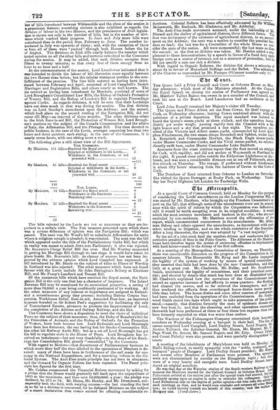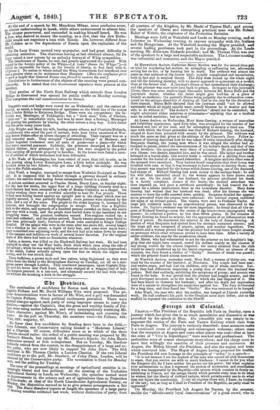gbe IfIttropolis.
At a special Court of Common Council, held on Monday for the purpose of considering the Lords' amendments on the London Corporation Bill, it was stated by Mr. Harrison, who brolightrup the Feeedom Committee's re
port on the bill, that although some of the amendments were not in accord- ance with the spirit of reform by which the Corporation was influenced,
still it would be worth accepting even in its crippled condition: it would admit the most eminent merchants and bankers in the city, who are now excluded by non. residence. Mr. Harrison moved the affirmation, of She report, which recommended concurrence in the amendments. Mr. Alder- excluded by non. residence. Mr. Harrison moved the affirmation, of She report, which recommended concurrence in the amendments. Mr. Alder-
man Sidney and others opposed the amendments, as inconsisent with each other, tending to litigation, and on the whole restrictive -of the franchise After a long discussion, the report was adopted by "a vast majority."
By the aid of a joint-stock fund the omnibus-drivers and conductors defy the corrective penalties of fines in the Police Courts. The Aldermen at the Mansion- house have therefore begun the system of sentencing offenders to imprisonment with hard labour—much to the dismay of the first sufferers.
At a meeting of the Metropolitan Commission of Sewers, on Thursday, there was considerable discussion on the progress of the Commission in its sanatory labours. The Honourable Mr. Byng and Mr. Leslie impugned the legality of the system of working by means of special committees: they asserted that little had been done by the new Commission, and that little at a great cost. Mr. Chadwick, Mr. Bailer, and Dr. Southwood Smith, maintained the legality of committees, and their practical neces- sity; and showed by details that much has been done at diminished cost. Mr. Chadwick explained how the operations of the Commissioners had caused an apparent increase of bad effiuvia in some quarters: the flushing had cleared the sewers, and so far relieved the atmosphere, and had thus rendered the effiuvia from overcharged house-drains more pereer
tibia than before. The house-drains and some other sources of annoyance had been excluded from the operations of the Commissioners. Dr. South-
wood Smith stated two facts which ought to take possession of the public mind,—namely, that districts formerly the seats of epidemic disease are now free from it; and that the cleansing and other operations connected therewith had been performed at three or four times less expense than had been formerly expended on what was worse than useless. The Wardens of the Fishmongers Company entertained their bonorarf members on Wednesday evening at a banquet in their hall. The list of
names comprised Lord Campbell, Lord Dudley Stuart, Lord Nugent. Mr' Justice Talfourd, the Solicitor-General, Mr. Hume, Mr. Hayter, Mr. W. Page Wood, Dr. Arnott, Mr. Samuel Rogers, and Mr. Etty. Count Teleki and Count Pulszky were also present, and were specially distinguished by toasts. A meeting of the inhabitants of Marylebone was held on Monday, at Hairs Riding-school, to testify sympathy with the " noble, maligned, an betrayed" people of Hungary. Lord Dudley Stuart presided; Mr. -11,11131e and several other Members of Parliament were present. The eloo°";"'" were not characterized by novelty on the Hungarian topic ; but the)" were of a very hearty and energetic tone. Lord Dudley Stuart intro- duced an original anecdote. He was that day at the Waterloo station of the South-western Railway at to moment the Ministers started for the Cabinet Council at Osborne House Palmerston arrived at the station just after the special train had started, bet , mediately sprang upon an engine in order to overtake his colleagues. Oolf Lord Palmerston ride on the engine of public opinion—let him take the advice. such meetings as that, and he would soon overtake and surpass all oilier Klos- ters- he world thereby consult the benefit of this'country, and the welfare Hungary also. (Loud cheers.) At the end of a speech by Mr. Monckton Milnes, some confusion arose, an elector endeavouring to speak, while others endeavoured to silence him. The elector persevered, and succeeded in making himself heard. He was a Jew, who desired to assure the meeting, as a Jew, that the Jew Roths- child would not negotiate a loan with Russia. He, however, differed from Mr. Cobden as to the dependence of Russia upon the capitalists of the
World. Sir De Lacy Evans seemed very unpopular, and had great difficulty in obtaining attention. The chairman having at last obtained silence, Sir De Lacy raised a new uproar by an unlucky betrayal of Whig sympathies.
The interference of Russia, he said, had greatly aggravated the quarrel. With regard to the foreign policy of the Whigs—(A voice" Damn the Whigs/")—it would be impossible for them, as the friends of liberty, to find fault with it. (grams) No nation in whose behalf the Whig Government had interfered ever sad a greater claim on its assistance than Haogary. (Here the conflation grew to such a height that General Evans was forced to resume his seat.)
Resolutions in furtherance of the objects of the meeting were passed una- nimously. It is stated that two Government reporters were present at the
meeting-
That portion of the North Kent Railway which extends from London Bridge to Gravesend was opened for public traffic on Monday morning. This completes the rail communication to Strood.
Doggett's coat and badge were rowed for on Wednesday; and the contest at- tracted, as usual, a large attendance of spectators on the whole line of the course from London Bridge to Battersea Bridge. There were six competitors: the fa- vourite was Messenger, of Teddington; but a " dark man," Cole, of Chelsea, "came out " in remarkable style, and won by more than a furlong; Messenger still proving his goodness by beating the other rowers a long way. Cole's father won the prize many years back.
John Wright and Mary his wife, bearing many aliases, and Charlotte Richards, a confederate who acted the part of servant, have been twice examined at Wor- ship Street Police-office on divers charges of swindling. Their roguery was on a very extended scale. They occupied " Lahurnam Cottage" at Hornsey; and thither beguiled tradesmen sent all sorts of goods—one a piano—for which they never received payment. Suddenly, the prisoners decamped to Hackney ; tracked thither, they attempted to fly again; but were stopped by the police while carrying off portable property in bundles. In the house were found a num- ber of articles of which tradesmen had been defrauded.
A Mr. Wade of Kennington has been robbed of more than 591. in coin, as he was passing along Lower Kennington Lane, a little before midnight. He was knocked down by two fellows; who got clear off, though the outrage occurred close to the Police-station.
John Wood, a burglar, managed to escape from Woolwich Dockyard on Tues- day. It is supposed that he walked through a gateway dressed in ordinary clothes; his convict dress having beeen subsequently found in a shed.
A serious accident occurred in Charles Street, Drury Lane, on Sunday night. For the last few weeks, the upper floor of a large building formerly used as a coach-factory had been occupied by a body of Roman Catholics as a chapel. On Sunday evening there was a crowded assembly to hear Dr. Fart preach. Three or four men having leaned against an upright post in the chapel which was not properly secured, it was partially displaced; somespersons were alarmed by the noise, and a cry of fire arose. The people in the street hearing it, increased the clamour, and besought the congregation to escape. There was a frightful rush to the stairs, and upwards of a hundred persons crowded on them; the stairs gave way with a crash, and the people were hurled down to the basetnent in one struggling mass. The greatest confusion ensued. Fire-engines rushed up; a dense mob collected; and the police arrived. Nearly twenty persons were found to have been grievously hurt; fourteen of whom were conveyed to King's College Hospital Of the people who were in the room after the stairs fell, several leaped from a window to the street, a depth of forty feet, and some were much hurt; many scrambled over adjoining roofs; and the rest had to be taken down by means of fire-escapes and ladders,—a work of several hours' duration. For the original alarm of fire there had been no foundation whatever.
Lakey, a mason, was killed on the Blackwell Railway last week. He had been employed to clear out the West India Dock ditch which runs along the side of the railway; while he was walking with a foreman on the rails, a train approached; in his alarm, Lakey actually sprang upon the line on which the engine was coming, and he was struck dead.
Three buffaloes, a grown male and two calves, being frightened as they were driven from the docks to the Birmingham Railway on Tuesday, set off on a dan- gerous career through London. They overthrew passengers, upset Captain Eog- Esti and his horse near Park Lane, and even charged at a waggon-load of hay. The keepers pursued in a tax-cart, and ultimately secured the bull with ropes ; not withent his breaking a horn in the struggle.



























 Previous page
Previous page